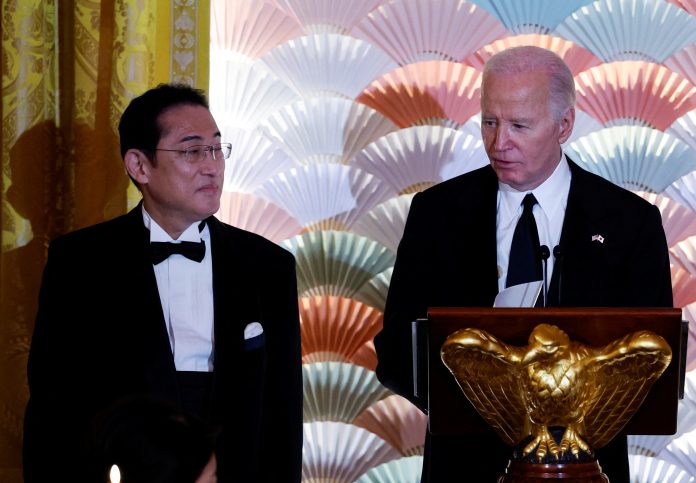US President Joe Biden on Thursday reiterated Washington’s readiness to defend the Philippines against any armed attack in the South China Sea at a summit with the leaders of Japan and the Philippines, in what was seen as a warning to Beijing and an attempt to reassure allies worried about China’s actions in disputed waters, Japan Times reports.
At the beginning trilateral talks at the White House with Prime Minister Fumio Kishida and Philippine President Ferdinand Marcos Jr. Joe Biden said:
“The United States’ defence commitments to Japan and to the Philippines are ironclad. Any attack on Philippine aircraft, vessels or armed forces in the South China Sea would invoke our mutual defense treaty.”
The three leaders agreed on a number of defence and economic initiatives, including joint naval patrols, increased coast guard cooperation and major infrastructure projects.
The Chinese Coast Guard is trying to prevent Philippine ships from resupplying a garrison stationed on a grounded warship near Second Thomas, an underwater reef. Beijing’s so-called “grey zone” activities in the South China Sea and the East China Sea have raised fears that tensions could escalate into a wider crisis, including one that would involve Washington and perhaps even other US allies such as Japan and Australia.
In a joint policy statement marking the launch of the new US-led multilateral Indo-Pacific Group, the three leaders accused Beijing of “dangerous and destabilising behaviour” by disrupting Second Thomas supply lines and preventing Manila from exercising “freedom of navigation on the high seas”.
They also criticised China for seeking to “undermine Japan’s long-standing and peaceful administration of the Senkaku Islands”, which are also claimed by Beijing, where they are known as the Diaoyu Islands.
The Philippines’ proximity to Taiwan and key sea lanes in the resource-rich South China Sea makes it an attractive staging post for the US and its allies, which could enhance its ability to respond to regional crises. This makes strengthening defence relations with Manila a crucial element of both Tokyo’s and Washington’s plans to contain and counter Beijing.
While each country has separately strengthened ties with Manila, Washington has recently sought to bring the countries closer together to deepen trilateral cooperation and build what it calls “collective capabilities” in the face of shared regional security challenges.
In this way, the Biden administration hopes to reduce redundancies and coordination problems in bilateral security ties in a grouping that experts say could have a format similar to the trilateral relationship between the US, Japan and South Korea.
The leaders on Thursday agreed on several trilateral security initiatives, including stepping up joint naval drills and exercises, not only among themselves but also with other partners. These exercises could be similar to last week’s joint patrols in the South China Sea, in which Australia also participated. Another such patrol is planned around Japan in 2025.
The partners will also promote coast guard cooperation, with Washington and Tokyo pledging continued support for building the capacity of the Philippine Coast Guard.
Other initiatives include more trilateral Coast Guard exercises and patrols this year to enhance interoperability, including plans to have Filipino and Japanese Coast Guardsmen patrol aboard a US Coast Guard ship.
There are also plans to increase trilateral maritime talks and expand humanitarian assistance and disaster response training as Washington seeks to use deployments in Japan and the Philippines as hubs for disaster relief and other crises in the region.
Tokyo and Manila are set to sign a bilateral agreement on visiting forces in the coming months, which will not only facilitate joint military exercises but also allow the Self-Defence Force to conduct rotational deployments.
The leaders also pledged to support the creation of “sustainable and reliable global supply chains for critical minerals”, especially for the production of batteries and other energy storage systems, including a US grant to Philippine company Eramen Minerals to develop a plant to process ore into nickel and cobalt.
The Philippines is the world’s second-largest nickel producer after Indonesia, and much of its reserves remain untapped.
Trilateral deals were also announced in semiconductors, clean energy and climate change.
